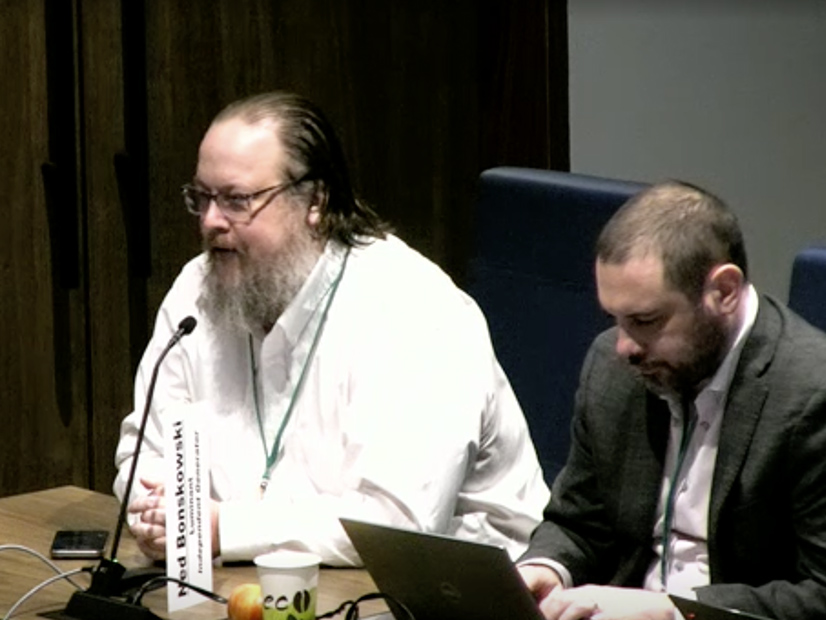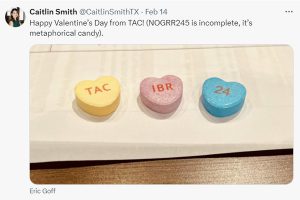
ERCOT stakeholders last week agreed with staff’s position to continue tabling a rule change that would address reliability concerns with inverter-based resources (IBRs) while both sides work on settlement discussions in an attempt to compromise.
The Technical Advisory Committee had agreed to move up its February meeting by a week to send a timely endorsement to ERCOT’s Board of Directors before the latter’s Feb. 27 meeting.
That the rescheduled meeting fell on Valentine’s Day was not lost on its participants. A bowl of “metaphorical” candy, printed with acronyms specific to the discussion, was set out for members.
“My only question is, [who] do I send the bill to for the bouquet of flowers I had to buy my wife for being here today?” Engie North America’s Bob Helton jokingly asked.
Eric Goff, speaking for the joint commentators negotiating with ERCOT staff, said those he represented were not opposed to keeping the nodal operating guide revision request (NOGRR245) on the table.
“We believe that we’re getting through productive dialogue with ERCOT,” he said. “There are some outstanding issues that will take some time to resolve, but I’m feeling cautiously hopeful … that we will be able to give something for the March TAC [meeting].”
ERCOT’s Stephen Solis agreed and apologized for not meeting the timeline.
“We’re not quite there yet,” he said. “We cleared up some misunderstanding, I think, and there are some core issues that we’re still working on where we stand apart and trying to find perhaps more creative ways of addressing that.”
The grid operator says the prevalence of IBRs on ERCOT’s system has increased the likelihood of potential instability issues, such as the recent Odessa disturbances. They say the issues are only going to increase along with the continued growth of solar and wind resources. (See NERC Repeats IBR Warnings After Second Odessa Event.)
ERCOT says the NOGRR would improve the clarity and specificity of IBRs’ voltage ride-through requirements. The measure would align the grid operator’s rules with NERC reliability guidelines and the most relevant parts of the Institute of Electrical and Electronics Engineers standard for IBRs interconnecting with the grid. (See ERCOT Technical Advisory Committee Briefs: Jan. 24, 2024.)
Vistra’s Katie Rich is serving as an independent arbiter during the settlement discussions, which Goff said could take either of two directions.
“One, we have a common agreement on language, which would be great. The other is ERCOT would file comments, we would file responsive comments, and Katie would tell us the difference between the two,” he said. “We’ll see which one we get to.”
TAC will meet twice before the board’s April 23 meeting.
NPRR1186 Goes to Board
TAC did not take up a protocol change (NPRR1186) regulating energy storage resources (ESRs) that was remanded back to ERCOT last month by the Public Utility Commission. (See Texas PUC Sends ESR Change back to ERCOT.)
The grid operator’s staff said that as the PUC’s directive ”seems straightforward,” they recommended the Board of Directors adopt the commission’s recommendations “without formally requesting additional input from the [TAC] or other stakeholder bodies.”
“The board’s authority to decide this question without soliciting stakeholder feedback is consistent with the governing statute,” staff said, noting stakeholders always can submit a comment on the NPRR for the board’s consideration.
The rule change sets a one-hour state of charge (SOC) for ESRs participating in two ancillary services (ERCOT contingency reserve service and non-spinning reserve). It also includes penalties of up to $25,000 per violation.
The PUC’s remand included “suggested modifications” to remove the SOC compliance requirements and other minor clarifications.
ERCOT also is asking the board to provide direction on NPRR1209, a directive from the directors, as NPRR1186 ran into trouble and has been tabled. The change would consider an SOC insufficiency by any ESR carrying an ancillary service resource responsibility to be a “failed quantity” that would result in a clawback of AS revenues.
Both measures are seen as stopgaps until ERCOT deploys real-time co-optimization, targeted for the latter half of 2026.
The ISO had 3.3 GW of ESRs on its system in June. It expects to have 9.5 GW of ESRs energized by October.
TAC: More Info on Budget
Staff’s two-slide presentation on the budgeted system administration fee’s forecasted adequacy for 2025 — “currently forecast to be adequate” and requiring no changes — led to a request from TAC for more background.
“It wouldn’t hurt to have maybe a few slides that actually show us the actual budget itself and kind of where we’re trending and what we’re spending the money on,” Reliant Energy Retail Services’ Bill Barnes said. “Some background: ‘Well, why is it adequate?’”
At TAC’s request during the 2016-2017 budget process, ERCOT provides stakeholders advance notice of any future administrative fee rate increases. The board in December approved the fee and the ISO’s budget for 2024-25 after the PUC trimmed both; the admin fee was cut from 71 cents/MWh to 63 cents/MWh, up from the previous 55.5 cents/MWh. (See “Revised Budget Passes,” ERCOT Board of Directors Briefs: Dec. 19, 2023.)
Controller Richard Schaal promised “a couple” of extra slides to provide more information.
8 Revisions on Combined Ballot
TAC’s unanimously approved combined ballot of voting items endorsed Rich as chair of the Reliability and Operations Subcommittee. Rich stepped aside temporarily in January after a job change.
The combo ballot also included four NPRRs, a NOGRR and a load planning guide revision request (LPGRR), and two changes to the settlement metering operating guide (SMOGRRs) that, if approved by the board, would:
-
- NPRR1193: Change the ERCOT-polled settlement (EPS) design-proposal form’s referenced location when it moves from the other binding document (OBD) list into the SMOG.
- NPRR1199: Revise the protocols to add definitions related to the Lone Star Infrastructure Protection Act (LIPA), a 2021 law that prohibits Texas businesses and governments from contracting with entities owned or controlled by individuals from China, Russia, North Korea or Iran if the contracting relates to “critical infrastructure.” The measure also adds language reflecting ERCOT’s statutory authorization to immediately suspend or terminate a market participant’s registration or access if the ISO has a reasonable suspicion that the entity meets any of the LIPA’s criteria, among other revisions.
- NPRR1210: Change the frequency of the next-start resource and the load-carrying tests from every five years to every four calendar years.
- NPRR1213: Amend requirements for distribution generation resources (DGRs) and distribution energy storage resources (DESRs) seeking qualification to provide ERCOT Contingency Reserve Service (ECRS). The NPRR also modifies requirements for ancillary service self-arrangement and ancillary service trades for DGRs and DESRs that provide non-spinning reserve on circuits subject to load shed.
- LPGRR074: Align specific term language in the profile decision tree “definitions” worksheet with profile segment language that was added to the “segment assignment” worksheet with the Public Utility Commission’s 2022 approval of LPGRR069.
- NOGRR261: Incorporate the OBD “Procedure for Calculating Responsive Reserve (RRS) Limits for Individual Resources” into the nodal operating guide.
- SMOGRR027: Move the EPS metering design proposal from the OBD list into the SMOG, standardizing the approval process, and amend the design proposal form to require more information identifying any and all distribution service providers that have the right to serve a project.
- SMOGRR030: Move the EPS metering facility temporary exemption request application form from the OBD list into the SMOG to standardize the approval process.




